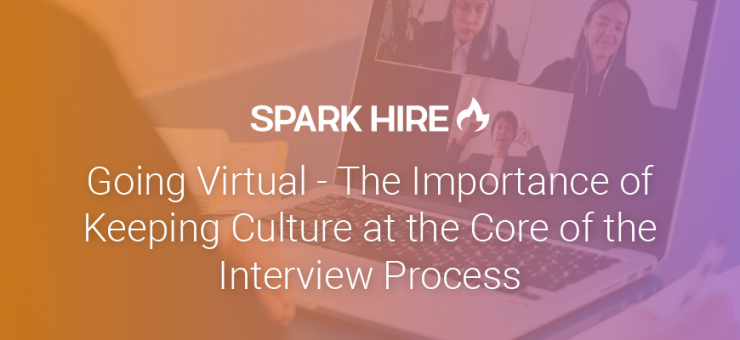More jobs than ever are remote. It’s the way forward for many companies and many more candidates are looking for remote and hybrid roles. It may seem like the vibrant work culture you used to project to attract top talent is a thing of the past. On the contrary, culture fit is more important than ever. Candidates expect to see your culture in your interview process.
Since the workforce has shifted to hybrid and remote work models, images of employees playing ping pong in the breakroom do not have the impact they used to. That’s not to say you should pitch them, but you need to be able to show candidates how they can connect with that same energy in your culture even if they work from home.
What better way to demonstrate your virtual work culture than through your video interview process? Let’s take a look at three essential factors to consider as you begin sharing your work culture through video interviews:
Defining the core of what connects your team
Assessing for culture fit is a standard part of your structured interview process. You should have standard questions that help you identify candidates who will add value to your culture. But you may not realize how important it is to show candidates the core values of your culture and not just focus on what makes work fun.
These core elements weave the fibers of your work culture and help your team feel connected to the bigger picture. They are crucial to help remote employees stay engaged with your on-site team and identify as part of the team instead of an extension of it.
For example, communication style may be one of the most important contributors to your company culture. While many hiring decision-makers consider communication a key soft skill, the tone and ways in which employees prefer to communicate play a part in how connections are maintained across a team.
Does your team enjoy sharing humorous GIFs and memes in emails? Do you rely heavily on emojis in chat? Maybe your interactions are a little more buttoned-up in the office and you enjoy shenanigans at happy hour instead.
Communication style is just one of the ways you can determine what makes your work culture tick and define criteria to help candidates assess for fit in the interview process. You can use these details to add remote company culture questions and enhance interactions in your interview process to give candidates an idea of how your team engages.
Identifying how culture translates into remote work
Of course, it’s clear how your team likes to interact in the office. But how does your culture come across in the remote work environment? Communication tools help keep everyone connected, but if employees sitting within an office space together interact in-person differently than with peers working from home, a rift can grow.
If remote and hybrid work is new to your team, you may want to discuss how the energy in your office can transfer into remote workspaces. Keep the basketball hoop over the trash can and enjoy friendly face-offs in the office, but look for ways to take brief breaks and enjoy social time online with remote team members as well.
There are integrations you can work right into your current workflow and communication tools to connect team members, such as Donut for Slack – which randomly pairs up employees for watercooler chat or mentorship opportunities. You can have teams complete virtual scavenger hunts, cooking classes, or play word games together.
When building the bridge between your in-office team and your remote team, you just need to learn what commonalities employees share and help them connect through your culture. You can use these interests to field for incoming talent that will be excited about your work culture and feel confident they can develop relationships with the team no matter where they work.
Demonstrating unity and consistency across the workforce
Naturally, not all roles can be remote. But if candidates are looking for positions that are fluid or can become flexible in the future, they will want to understand how those transitions will impact their employee experience. During video interviews, you don’t want to share how your remote work culture differs from your in-office culture as much as you need to show how it’s consistent.
Your structured interview questions that screen for culture fit give candidates clues about what it’s like to work with your team. Follow-up questions can help you assess if they fit into remote roles, but the focus should be to find talent that blends seamlessly into your work culture overall.
Getting current employees in on live video interviews and sharing video messages during the interview process allows candidates to get a sense of how your team makes connections virtually. This process is just as valuable as assessing how a candidate communicates and shares their personality through video.












